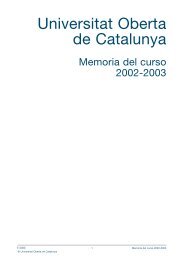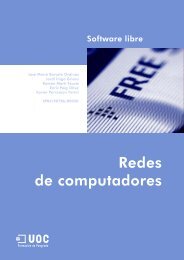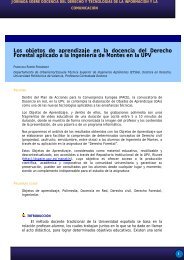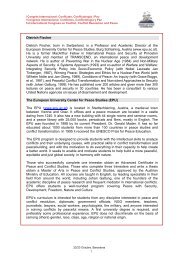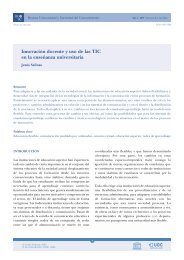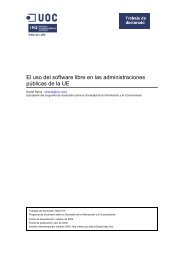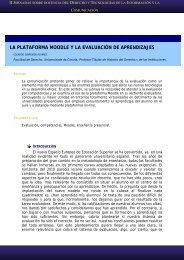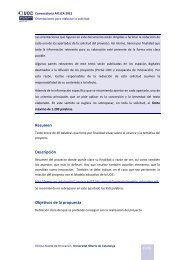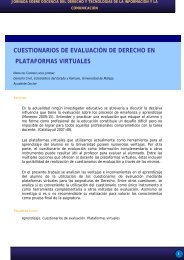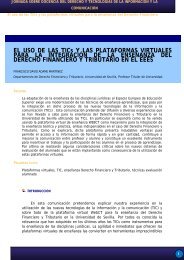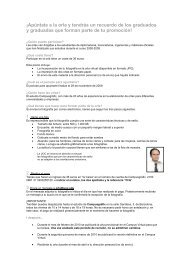E-<strong>governance</strong> <strong>and</strong> Citizen Information 40 Theoretical Framework. The Network Administration2.4.3. Change <strong>and</strong> New Conceptualisation of CitizensDuring the 1980s, there was a common belief that solving the problems of efficiency, secretism,slowness, etc. would improve the global operation of the public sector <strong>and</strong>, in turn, improve<strong>citizen</strong>s' relationship with <strong>and</strong> bad perception of the Public Administration. To tacklethese problems we can highlight two lines of action.Firstly, part of the action is focused on improving the support <strong>and</strong> <strong>de</strong>livery of services to improve<strong>citizen</strong>s' perception of the Public Administration. Secondly, <strong>and</strong> directly linked to thetheories for the improvement of <strong>de</strong>mocracy, another part of the action is focused onstrengthening the view of transparency <strong>and</strong> accountability of government, thus creating newspaces <strong>and</strong> channels for <strong>citizen</strong> participation.Beneath these two lines, there are two perceptions of the concept of the <strong>citizen</strong> that in somesituations can be mutually exclusive: <strong>citizen</strong>s as customers <strong>and</strong> as individuals with a seriesof political rights.a) Citizen as Customers: Trends <strong>and</strong> ProblemsCitizens' perception of Public Administrations can be explained by various factors. Firstly,according to various empirical studies, in general there is a direct positive relationship betweena country's living st<strong>and</strong>ards <strong>and</strong> its satisfaction with public bodies. Secondly, <strong>citizen</strong>shave a negative opinion about the Administration, in accordance with the generalised i<strong>de</strong>ason the running of bureaucratic organisations, mainly linked to their most negative aspects:slowness, secretism, inefficiency, etc. (OCDE, 1991). Finally, <strong>and</strong> of particular interest to ushere, the perception of the Administration is finally built with the contact between <strong>citizen</strong>s<strong>and</strong> the Administration, mainly in the provision of <strong>information</strong> <strong>and</strong> services. In this case, thedifference with the previous cases lies in the fact that the perception of the administration isgenerally based on direct experience, so that the conception of the Administration has morefavourable results. Since it is an environment based on experience, it is possible to have animpact on <strong>and</strong> improve it (OCDE, 1991).If we focus specifically on the Catalan Administration, various studies back up the previousopinion about the different perceptions of the population. 7 In the survey on <strong>citizen</strong>s' opinionof the public function inclu<strong>de</strong>d in the White Paper on the Public Function (2006), 72.2% of7. http://www.i<strong>de</strong>scat.net/cat/i<strong>de</strong>scat/estudisopinio/rpeo/R-345.pdfhttp://www.uoc.edu/in3/pic
E-<strong>governance</strong> <strong>and</strong> Citizen Information 41 Theoretical Framework. The Network Administrationthose surveyed consi<strong>de</strong>r that the Public Administration is slow <strong>and</strong> 46.5% consi<strong>de</strong>r that it isvery strict in terms of compliance with regulations. However, 55% of those surveyed state thatthey have a “very good” or “good opinion” about the public service offices of the Generalitat.Therefore, there is a qualitative leap in <strong>citizen</strong>s' generalised negative perception towards administrations<strong>and</strong> a good opinion based on direct experience.Within this context, several years ago many administrations started to implement strategiesaimed at improving relationships with <strong>citizen</strong>s through improved quality of <strong>information</strong> <strong>and</strong>services. This happens in the environments addressing public services <strong>and</strong> the <strong>de</strong>livery ofthese services, especially in the spaces where <strong>citizen</strong>s' image of the administration canhave a major impact. In this sense, the internal evaluation <strong>and</strong> quality regulation adaptationprocesses are more common in the public sector. In general, there is a new approach formost of the indicators that must gui<strong>de</strong> the i<strong>de</strong>al running of the public sector, adapting themfrom the ones used in the private sector.The improved relationship with <strong>citizen</strong>s has been possible thanks to the incorporation of valuesfrom private companies. As a result, not only do the parameters governing the internalrunning of the public sector change, there is also a reconfiguration of the figure of the <strong>citizen</strong>,who becomes a customer or a consumer of services. This change in approach is mainly introducedfrom the doctrines of NPM, in accordance with the concept of the focus on the customer(Osborne <strong>and</strong> Gaebler, 1994; Barzelay, 1992), obtaining an important acceptance inthe administration mo<strong>de</strong>rnisation processes in any part of the world (initially in countriessuch as New Zeal<strong>and</strong>, Australia, Italy, Norway, etc., recently exten<strong>de</strong>d to Asia, Africa, LatinAmerica, etc. [Barzelay, 1992]).This transformation aims to improve the activity of the Administration by paying greater attentionto the relationships established with its customers (Brugué et al., 1994). Therefore,<strong>de</strong>spite the fact that <strong>citizen</strong>s are used to a market that offers personalised products, the Administrationhas been traditionally characterised by offering products with no distinctions(Osborne <strong>and</strong> Gaebler, 1994). To face this situation, the NPM proposals aimed to offer <strong>citizen</strong>spublic services focused on the specific needs of each <strong>citizen</strong>.Electronic government initiatives adopted the NPM doctrines with the same emphasis on thefocus on the <strong>citizen</strong>, marking the need to improve the quality of services, access to <strong>information</strong>,creation of new interaction channels, etc. (Zweers <strong>and</strong> Planqué; Margetts <strong>and</strong> Dunleavy,2000). In this sense, as stated by Dunleavy <strong>and</strong> Margetts (2000) or Soete <strong>and</strong>Weehuizen (2003), ICTs <strong>and</strong> in particular Internet logic should take more account of the usersof the Administration <strong>and</strong> use their feedback for the re-engineering of the public services;while <strong>citizen</strong>s <strong>and</strong> governments can follow the procedures directly with a disintermediationhttp://www.uoc.edu/in3/pic




